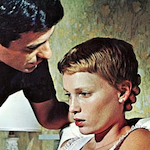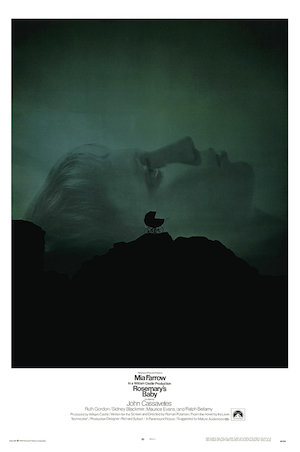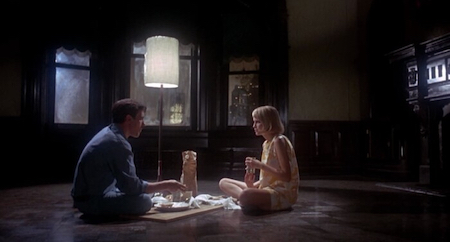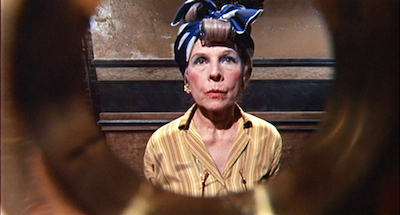 The central theme of ROSEMARY’S BABY (1968) is right there in the title. It’s about someone having a baby, so it’s about fears surrounding a healthy pregnancy and beginning a new life as a parent. That’s part of what makes the movie so powerful, but one way I know it’s good is how effective it is even for someone like me, a non-parent, a childless cat lady. I’m sure it kicks your ass harder if you’re an expecting or aspiring parent, but it has other things going for it too.
The central theme of ROSEMARY’S BABY (1968) is right there in the title. It’s about someone having a baby, so it’s about fears surrounding a healthy pregnancy and beginning a new life as a parent. That’s part of what makes the movie so powerful, but one way I know it’s good is how effective it is even for someone like me, a non-parent, a childless cat lady. I’m sure it kicks your ass harder if you’re an expecting or aspiring parent, but it has other things going for it too.
My main association with ROSEMARY’S BABY is that it was my mom’s favorite horror movie. That might just mean it was one of the few she’d seen. But I remember when I was a teen obsessed with Freddy Krueger and Clive Barker she said “Do you want to see a real scary movie?” and we rented it. As far as I remember I thought it was pretty good, but not enough that I thought of as a favorite. It didn’t make it into the rotation.
That was more than three decades ago. For years now I’ve been wanting to revisit it and review it for the day before Halloween, my mom’s birthday. But I always get behind on all my other plans and get bogged down. I decided to make it happen this year even before I realized there was a new prequel on Paramount+, but I’ll review that soon.
Now I watch ROSEMARY’S BABY and I wish I could discuss it with my mom, see if she has any thoughts about why she liked it so much. Was it only that it was the respectable horror movie of her era, a really good one that was low on blood and spooks, high on paranoia and betrayal? Or was there anything deeper to it? Did she relate to those fears about birth and autonomy? It’s not the kind of stuff we talked about. After it’s too late you start to realize how much more attention you should’ve paid to your parents. Now we go back and try to piece it together from memory, like Rosemary Woodhouse (Mia Farrow, SUPERGIRL) trying to remember the encounter she had with Terry Gionoffrio (Angela Dorian, INVASION OF THE BEE GIRLS) in the laundry room before she fell to her death.
 Obviously/hopefully my tastes have evolved, I can appreciate a Freddy-less movie more than when I was young. I also think that being married, and even just having moved into apartments, gives me more real world things to grasp onto than the last time I saw it. That’s some of the other stuff this is about, besides having a baby: marriages, living situations, relationships with neighbors. And also careers. The (spoiler for famous ending of famous movie) satanic cult that forces Rosemary to birth the Devil’s son (no relation to Petey Wheatstraw) gets to her husband Guy (John Cassavetes, fresh off of THE DIRTY DOZEN) through his ambition, or perhaps his insecurity. He’s a stage actor, he’s been in some big plays and commercials, but he wants more. And they give it to him. They make him a headliner. It’s a Faustian bargain, but the fucker doesn’t sell his soul, he sells his wife’s bodily autonomy. What he does is so wrong that his cover story for her post-demon-assault injuries is that he forced himself on her while she was unconscious. Even leaving out later developments with the writer/director of the movie, this scene is all the more unsettling because I’m not sure if it means people considered marital rape acceptable at the time. He sure says it like they do. I’m not telling you what to do but personally I will be boycotting any plays featuring Guy Woodhouse, no matter how small the role.
Obviously/hopefully my tastes have evolved, I can appreciate a Freddy-less movie more than when I was young. I also think that being married, and even just having moved into apartments, gives me more real world things to grasp onto than the last time I saw it. That’s some of the other stuff this is about, besides having a baby: marriages, living situations, relationships with neighbors. And also careers. The (spoiler for famous ending of famous movie) satanic cult that forces Rosemary to birth the Devil’s son (no relation to Petey Wheatstraw) gets to her husband Guy (John Cassavetes, fresh off of THE DIRTY DOZEN) through his ambition, or perhaps his insecurity. He’s a stage actor, he’s been in some big plays and commercials, but he wants more. And they give it to him. They make him a headliner. It’s a Faustian bargain, but the fucker doesn’t sell his soul, he sells his wife’s bodily autonomy. What he does is so wrong that his cover story for her post-demon-assault injuries is that he forced himself on her while she was unconscious. Even leaving out later developments with the writer/director of the movie, this scene is all the more unsettling because I’m not sure if it means people considered marital rape acceptable at the time. He sure says it like they do. I’m not telling you what to do but personally I will be boycotting any plays featuring Guy Woodhouse, no matter how small the role.
 At first, though, their marriage seems strong. They laugh together, they seem to like each other’s quirks, they support each other. Moving into the Bramford in Manhattan is an adventure they embark on together. When they’re invited over for dinner by enthusiastic older neighbors the Castevets, Minnie (Ruth Gordon, EVERY WHICH WAY BUT LOOSE) and Roman (Sidney Blackmer, REVENGE IS MY DESTINY), Guy is exhausted and doesn’t want to go. Rosemary is sincerely okay with staying home, but Guy relents as his “good deed for today.” They agree “we’ll make it clear it’s just for this one night, and not the beginning of anything,” but I’m not sure how that would work. They definitely do not make that clear. But they go over there as a team, they laugh together about the awkwardness and the terrible food, they have a good time.
At first, though, their marriage seems strong. They laugh together, they seem to like each other’s quirks, they support each other. Moving into the Bramford in Manhattan is an adventure they embark on together. When they’re invited over for dinner by enthusiastic older neighbors the Castevets, Minnie (Ruth Gordon, EVERY WHICH WAY BUT LOOSE) and Roman (Sidney Blackmer, REVENGE IS MY DESTINY), Guy is exhausted and doesn’t want to go. Rosemary is sincerely okay with staying home, but Guy relents as his “good deed for today.” They agree “we’ll make it clear it’s just for this one night, and not the beginning of anything,” but I’m not sure how that would work. They definitely do not make that clear. But they go over there as a team, they laugh together about the awkwardness and the terrible food, they have a good time.
Afterwards, Guy says he liked Roman’s stories so much he’s gonna go over again the next day. Maybe what he really liked was Roman having seen one of his plays and having very specific flattery for him. Setting aside that Guy has either made or is about to make his deal with the devil, this is very relatable as a moment in a relationship when the team is broken up.
My wife and I are firm believers in being able to do some things separately. I usually go to horror movies and funk shows without her, she watches sitcoms and British dramas and sees indie bands without me, hangs out with friends without me when I don’t feel like going. We do most of everything else together because we want to, not because we feel obligated. I don’t think the Woodhouses are that much more old fashioned than us. They want their own lives, it just hurts that they started out on the same page with this and then right away they weren’t. Rosemary doesn’t mind if he hangs out with the Castevets without her, she’s just surprised that he’s more into them than she is, and that she didn’t pick up on it. No big deal, but it is the beginning of something.
Ultimately, after the reveal, it’s a case of differing values, not just the satanism, but the career stuff. She was already so proud of what he’d done. Now he gets bigger at the expense of another actor going blind. Not cool. Even if it’s temporary.
The movie might be even better if you have no idea where it’s going and think Rosemary might be losing it. But it works great when we know she’s right and nobody’s listening to her – a familiar situation in both movies and life. I love the succession of details and hints: the herb garden of the apartment’s former tenant, the odd realization that she moved a cabinet in front of a closet door, the Castevets giving Rosemary the smelly herb good luck charm their other young friend Terry was wearing when she died. Multiple layers of questionable taste there.
 The Castevets are such great, unique villains because they’re so funny, and still seem somewhat benign up until the end. They’re very relatable to weirdos in your life who get to be pushy and irritating but you like them and try to be polite. Rosemary seems at least a little amused by Minnie being “the nosiest person I’ve ever seen,” and I couldn’t get enough of her living up to that description. But the constant friendly-ish pestering and “helping” escalates into harassment.
The Castevets are such great, unique villains because they’re so funny, and still seem somewhat benign up until the end. They’re very relatable to weirdos in your life who get to be pushy and irritating but you like them and try to be polite. Rosemary seems at least a little amused by Minnie being “the nosiest person I’ve ever seen,” and I couldn’t get enough of her living up to that description. But the constant friendly-ish pestering and “helping” escalates into harassment.
Gordon is my favorite part of the movie, and she won the best supporting actress Oscar for it, beating out Lynn Carlin in Cassavetes’ FACES. Take that, Guy. But the whole supporting cast is great. Their friend Hutch is played by Dr. Zaius himself, Maurice Evans. The prescribed-by-Minnie doctor Abe Sapirstein is played by Ralph Bellamy, who you and I know from DISORDERLIES. A very young Charles Grodin (CLIFFORD) pops up as the other doctor she gets advice from. And the elevator operator is played by that bad, bad D’Urville Martin, director of DOLEMITE. (Wesley Snipes played him in DOLEMITE IS MY NAME and is made fun of for bragging about this small part.)
It’s kinda funny that it’s produced by William Castle. He bought the rights to the novel by Ira Levin before it was published, and he brought it to Robert Evans at Paramount who was interested but not with Castle directing. Still, they should’ve done a gimmick where you smell the nasty tannis root in the theater. (It’s not a real thing so they could use patchouli or something.)
Variety’s review at the time mentioned that “the film holds attention without explicit violence or gore,” which had me wondering which movies they were comparing it to. Horror movies that were recent at the time include THE ASTRO-ZOMBIES and THE BLOOD BEAST TERROR. NIGHT OF THE LIVING DEAD didn’t come out until later in the year. I guess BLOOD FEAST already existed, and maybe some of the Hammer or Mario Bavas had some blood, but was it really that unusual not to be bloody? Somebody educate me.
I’m not familiar with the author Ira Levin, so I was surprised to see how many movies are based on his stuff: A KISS BEFORE DYING, NO TIME FOR SERGEANTS, THE STEPFORD WIVES, THE BOYS FROM BRAZIL, DEATHTRAP, and most importantly the Sharon Stone erotic thriller SLIVER. Oh shit, that’s a ‘90s version of ROSEMARY’S BABY, isn’t it? You move into an apartment building in Manhattan and instead of satanic forced birth you get peeped on. That was more what was in the air at that time.
Reportedly the whole your-neighbors-and-their-friends-are-a-satanic-cult-and-you’re-gonna-have-a-devil-baby thing was absolutely shocking in ’68. I’m not sure how many people still feel that way, it’s a very silly premise, but the movie gets away with it by never really showing or confirming it until the very end. By then you just go with it. The huge popularity of the movie kicked off a trend of religious horror that basically just became a subgenre of its own, though most of them are much more based in Catholic ritual and sincere beliefs. According to the book Shock Value: How a Few Eccentric Outsiders Gave Us Nightmares, Conquered Hollywood, and Invented Modern Horror by Jason Zinoman, William Peter Blatty decided to write The Exorcist on his way out of a showing of ROSEMARY’S BABY at Mann’s Chinese Theater. “That’s the kind of book I’d like to write,” he told his wife, though he didn’t like the ending. “Instead of taking this struggle with faith seriously, Blatty felt that the movie just became another horror show… To Blatty, the Devil was not a set of glowing eyes. It was real, and in allowing him to succeed, the movie was not only in bad taste, but lost its moral bearings.”
This being up there with the most famous movie endings from before my time, it was interesting to read about famous authors having hot takes like that about it. Ray Bradbury went to the movie twice, then wrote that “I simply do not believe or accept the ending of ROSEMARY’S BABY.” He felt that since Rosemary was holding a knife she would’ve wanted to kill one of the people who wronged her, or the baby. I’m sorry to scoff at a great deceased writer from the safety of the living world, but that’s obviously the point of the scene. We want and expect her to stab someone, we don’t want or expect her to accept her fate, that’s why it’s a gut punch, that’s why it’s good.
Bradbury’s little piece about it offered a fan fiction alternate ending. His Rosemary also puts the knife down, but then she flees with the baby, chased by the satanists, runs into a cathedral and says, “O Lord, O God, O Lord God. Take back your Son!” He was so confident this was a self-evidently better ending that he wrote, “Fade to black. The End. And that, my friends, is the way Rosemary’s Baby should have ended. Which then would have sent audiences out into the night to think what kind of idea had just run over them. Which then would have sent everyone home to crack the Old Testament or probe through Paradise Lost after Milton’s Dark Angel.”
Okay, thanks Ray. Levin didn’t write it that way because he knew he was writing fiction. In 1979 he told an interviewer, “I really don’t believe in the occult. I have no quarrel with the people who do if it fills their needs.” He did not like that the movies made in the wake of ROSEMARY’S BABY were getting gorier, citing the (obviously great) glass sheet scene in THE OMEN. You and my mom too, sir. But I was intrigued to read that in 1992 he said he had some guilt about “this popularization of the occult and belief in witchcraft and Satanism… all these people who hear backward messages in song lyrics and stuff like that.” Maybe he meant that it inspired people to get into the occult, but I’m reading it as it inspired people to fear the occult. A made up thing from a book.
Maybe that’s why the satanists here aren’t any of the usual societal scapegoats. I’m used to horror movie cults representing the feared other: witches, weirdos, heavy metal fans, non-Christians. Here there’s a certain association with new agey stuff, what with the herb gardens, but these are an older generation victimizing the youngest characters, Rosemary and Terry. I love that when Rosemary gets her famous short haircut it’s something she just does on her own, she thinks it’s cool, she got it from Vidal Sasoon! But her husband and neighbors all have to make comments about it. Not necessarily just because it’s a woman with short hair in 1965 (when the movie takes place), but because she’s asserting herself, making her own choices, not following the path they see for her.
Which is why this is a sadly timely movie, and it brings us to the irony of the title: nobody else seems to consider it to be Rosemary’s baby. This story is so much about other people making her reproductive decisions for her, down to giving her a doctor who shares their beliefs and not hers, not listening to her when she’s unhappy with him, and trying to stop her from getting a second opinion anywhere. She’s excited to have a baby with Guy, doesn’t know she’s gonna get raped by the devil and then hand over the baby to others. And the true horror of the ending is not the glowing-eyed Satan baby, but the subsequent shot of Rosemary seemingly accepting that this will be her life now, the one they decided for her without telling her, and tried to hide from her behind a secret passageway in the closet.
That’s the secret, I think. The scary part isn’t the Devil existing, it’s Rosemary being forced into a life others chose for her. They’ll probly make her grow her hair out, too.
I don’t believe in ghosts and goblins, but I do sometimes write movie reviews for the dead. You were right, Mom. ROSEMARY’S BABY is a good one. Happy birthday.


























October 30th, 2024 at 12:28 pm
I’ve seen so many riffs and spins on this material, but had never actually watched the film until just last month. I was surprised at how modern and lively it felt, with great pacing, snappy dialogue, a delightful Ruth Gordon performance. And sadly its themes are still relevant to the modern era, following a woman who is robbed of agency and betrayed at every turn. Mia Farrow is especially good here– love that oner in the phone booth toward the end. Such a long shot, and she carries you through Rosemary’s fear, paranoia, desperation, hope, scheming, etc. I also love the way dreams are depicted in this– they feel true to life as surreal vignettes that fade in and out.
I also thought it was weird/gross that their cutesy excuse for the pregnancy is marital rape. And I find it really crazy that this is a film about an actor’s pregnant wife being menaced by a cult, and Polanski’s own pregnant wife, Sharon Tate, was attacked by the Manson Family the following year.
Imagine if William Castle hid some actors in the back of theaters and had them yell “Hail Satan” at the end.